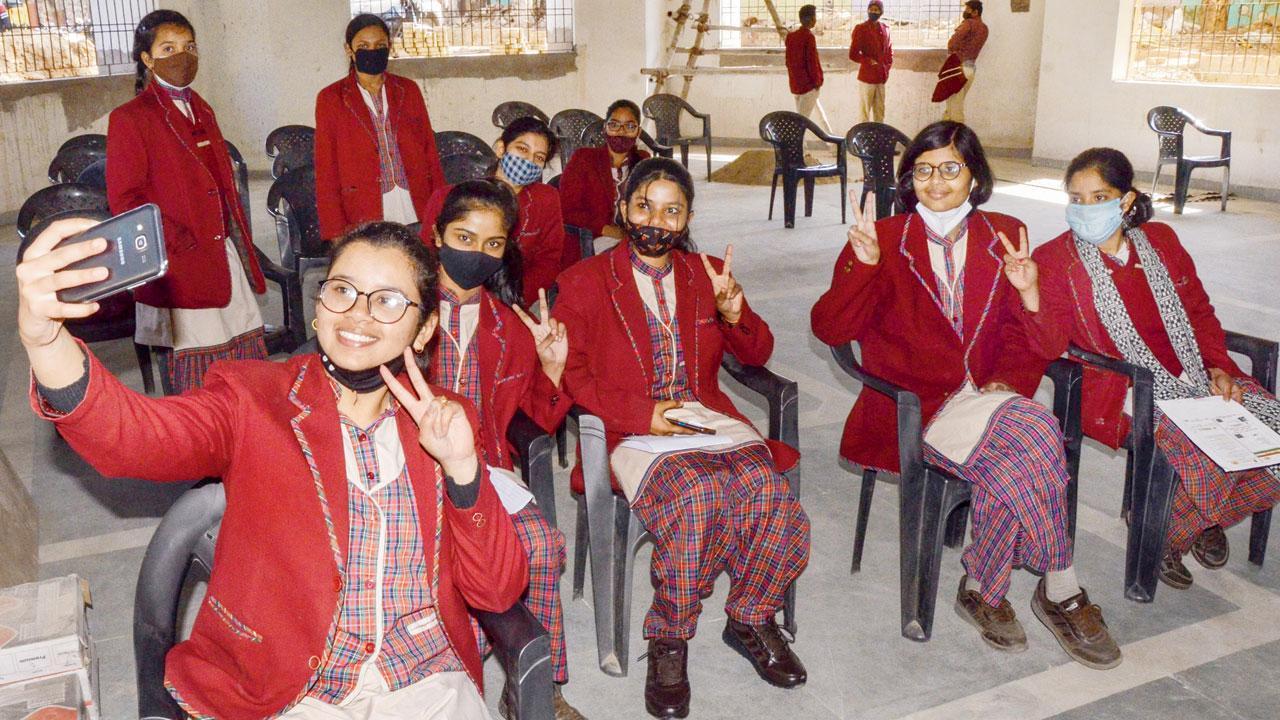With schools and colleges set to reopen in Feb, some private institutes call for regular COVID tests of students, majority of experts oppose move, say not advisable and may lead to trauma and fear

Students wait to get vaccinated at the two-day drive organised by Children’s Academy Group of Schools with Americares India Foundation at the school premises in Malad
As private schools and colleges are set to reopen from February, it has come to light that some educational institutes are insisting for mandatory RT-PCR and rapid antigen tests for students. The move has invited differing opinions from paediatricians and healthcare experts, even as majority feel tests need not be compulsory. Citing that WHO or Indian Academy of Pediatrics has not made any such guideline, they said that regular testing may lead to unnecessary trauma and fear among both students and parents. Some also added that frequent swab collection from nostrils and throat is not advisable.
ADVERTISEMENT
“With all schools reopening, it has been seen that some have started mandatory RT-PCR few times a week and daily rapid antigen tests for all children attending school. There have been no such guidelines issued by WHO or IAP which recommends such testing. This will impose unnecessary trauma and fear among children and parents,” said Dr Fazal Nabi, Director, Department of Paediatrics at Jaslok Hospital.
Covid mild among kids
Dr Nabi said, “It has been seen in the previous waves that children have mild and self-limiting courses of infection. Symptomatic management with paracetamol is sufficient. Antibiotics and antivirals are not needed in the majority of cases. We should also emphasise that though children are not yet vaccinated, 70-80 per cent of them have acquired natural immunity as evident by their antibody titres. So, they are not active sources for spreading infection as long as they are asymptomatic. Hence, regular swabs and tests don’t serve any role.”
“Such illogical practises will unnecessarily cause discomfort and children being soft targets should not be mistargeted. Parents should raise this issue to higher authorities as it will be an unethical practice to be followed till future,” Dr Nabi said. Nishit Kumar, managing director at Centre for Social and Behaviour Change Communications, said, “While children can contract Covid-19, the impact is said to be mild. Children attending schools should follow Covid-appropriate behaviour… Making testing mandatory for returning to classes is neither warranted nor is it practical.”
No science behind it
Dr Samir Dalwai , member of the state Paediatric Task Force and national treasurer of IAP, said, “All directions regarding Covid-19 are coming from authorised scientific bodies, based on scientific evidence. There is no scientific evidence to ask for RT-PCR or rapid antigen tests for regular students. The only way to prevent infection is following the guidelines like compulsory mask and social distancing. And, if the child has symptoms like fever, cold and cough, the guidelines recommend that parents should not send the child to school.”
Dr Santosh Bansode, Head of the Department, Emergency Medicine, Wockhardt Hospitals, Mumbai Central, said, “We must train teachers of schools about Covid-19 symptoms. We must inform all children and their parents about the symptoms and ask them not to attend school physically if symptoms are there. Social distancing, masks and hand hygiene should be followed.”
Risk of injury
Dr Prashant Kewle, ENT surgeon at Sushrut Hospital, Chembur, said, “School children should not be exposed to unwanted tests, especially RT-PCR. Kids’ nasal and throat cavities are small, and there is always a high risk of getting injured, by puncturing the mucus membrane or nasal cavity, leading to bleeding and subsequent complications to the brain and eye, which cannot be ruled out. If a child is unwell, the parents need not send the child to school.”
BMC Speak
Suresh Kakani, additional commissioner (health), BMC, said, “We (BMC) have started schools from January 24, and we have not issued any directives for conducting RT-PCR or rapid antigen tests for students. I am not aware about private schools or schools that are outside BMC limits. Also, for BMC-run schools, we have provided them with masks and sanitisers for the students.”
When asked about vaccination being voluntary as stated by the Centre and state’s insistence for double-dose certificates, Kakani clarified, ““In larger public interest, we anticipate that everyone should be vaccinated, and for the same, the corporation has started vaccination camps across the city colleges. Also, in case of any future directives, we would abide by the same.”
Other view
Dr Subhash Hira, professor of Global Health at University of Washington and Member of Covid prevention review panel of WHO Geneva, pointed out that for the past two years, there has been total disruption in the educational system. He said instead of children carrying infections back home to their grandparents, once a week testing (rapid antigen) of all asymptomatic children will cut down the transmission risk and stabilise the situation as the need of the hour is to early detection. “This experiment has been doing well in most of the developed countries like USA and Europe, where such early detections help in preventive steps to be taken by school authorities,” he said.
24 Jan
Day when civic-run schools reopened
 Subscribe today by clicking the link and stay updated with the latest news!" Click here!
Subscribe today by clicking the link and stay updated with the latest news!" Click here!







